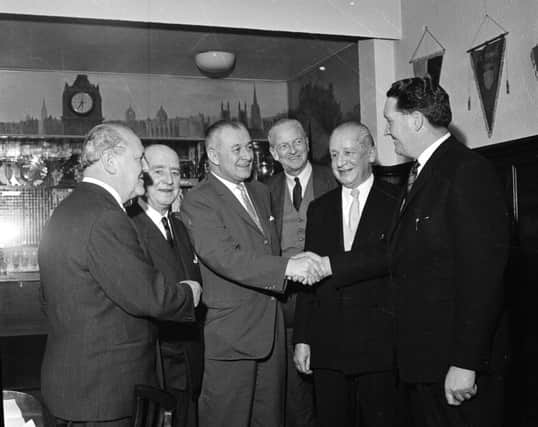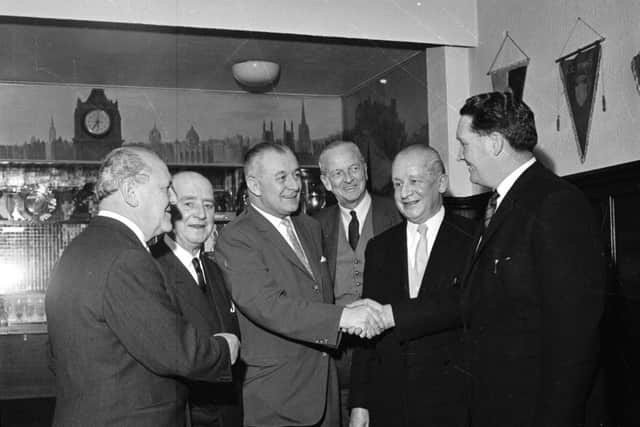Stars of Sixties hail Hibs’ year under Jock Stein


Stein had won the Scottish Cup in 1961 with Dunfermline, his first managerial post, and the Fife club went on to be a power in the game after he left, winning the cup again in 1968 and along with Kilmarnock being the biggest challenge to the Old Firm in the league in the latter half of the 1960s. Something similar happened at Hibs.
It was on a smaller scale, admittedly – the Summer Cup, in the trophy room within months of Stein’s arrival, hardly compares in importance to the nation’s principal knockout competition. But for the players, whose self-belief could scarcely have been lower when he took over, Stein was a catalyst, both inspiring them with his sheer force of personality, and instructing them in the practical side of football.
Advertisement
Hide AdAdvertisement
Hide Ad“When he spoke to the players in the dressing room on his first day here, all he said was, ‘There will be changes made here – but you’re the players that’ll make the changes’,” Pat Stanton recalls in the programme, simply called Jock Stein. “You were going to get your chance but, if you didn’t do it, you’d be going out the door. So he just laid it on the line right away, but he didn’t come stampeding in and throwing the china about the place.


“When he came here he put me to play at the back as a double centre-half. That was more suited to my game.
“I wasn’t aware of it. I was still plugging away in midfield, but he saw something that would improve me – which it did.”
And Hibs as a whole also improved quickly under Stein, as that Summer Cup win showed. “It was a breakthrough,” Stanton continues. “It was not the most important trophy – but it was a trophy.
“All right, they’d won the league away back in the late 1940s, early 1950s with that great side. But that was a big thing for the club.”
Peter Cormack, two years younger than Stanton and at the time a very inexperienced 17-year-old, agrees with that verdict. “I was quite chuffed when we won that, because it gives you a lift,” he recalls. “It takes you to another level when you do win something.”
Shortly after that Summer Cup win, Real Madrid visited Easter Road for a friendly, and Cormack, then 17, got his chance to play in a 2-0 home win. “I got called in and I thought I’d maybe be on the bench, in the squad. But he said, ‘No you’re in. You’re playing. Just go out and enjoy yourself. You’re good enough.’ And that was it.”
That was a double masterstroke by Stein. Attracting the biggest club in Europe to Easter Road, and then telling a young player like Cormack that he was good enough to go toe-to-toe with them. With a man of such obvious stature telling you he believed in you, how could you fail to believe in yourself?
Advertisement
Hide AdAdvertisement
Hide AdStanton sums it up well. “Real Madrid – you had photographs of these chaps on your bedroom wall. It was like playing cowboys with John Wayne.”
Cormack left Hibs for Nottingham Forest in 1967, then three years later went on to Liverpool, where he won the league, the FA Cup and the Uefa Cup under Bill Shankly – whose brother Bob succeeded Stein as Hibs boss.
Half a century on, Cormack has lost count of the number of times he has been asked to compare the two great Scottish managers, to weigh up their different strengths and weaknesses and to calculate how they would rank against the other great managers of their day such as Don Revie and Matt Busby.
But rather than draw up any hypothetical league table of greatness, he prefers to dwell on a quality they had in common. “I was fortunate to play under Shankly and Stein,” he says. “I’ve often been asked what was the difference between the two, and I always say that it wasn’t like that. In my time the Revies, the Steins, the Busbys had the respect of players.
“Don’t get me wrong – there was a fear factor there, because you knew what would happen if you stepped out of line. Sometimes you went in on a Monday morning and someone said ‘The boss is wanting to see you’. And you’d always think, ‘F****** hell, what have I done wrong?’, because you were terrified.
“But that was not so much fear as the respect you had for them. And then when you went in he’d maybe say, ‘Aye, ye’re daein’ really well, son. Keep it gaun. I want ye to jist dae what ye’re daein’. And you’d come away thinking ‘Aw, great’. They very rarely pulled you in. That’s why you were terrified when someone told you the boss was wanting to see you.
“I would assess Jock Stein’s legacy very simply as one of the best managers that has ever been.”
Whatever hopes they had for their own careers, the Hibs players who served under Stein appear to have been aware that they were in the presence of a man who was destined to achieve great things in the game. They knew he would not be with them for long.
“When he left Hibs and went to the Celtic, you were disappointed,” Stanton says. “But you weren’t surprised.”
• Jock Stein, produced by purple-TV, will be shown on BBC Alba at 9pm on Monday, 9 June.